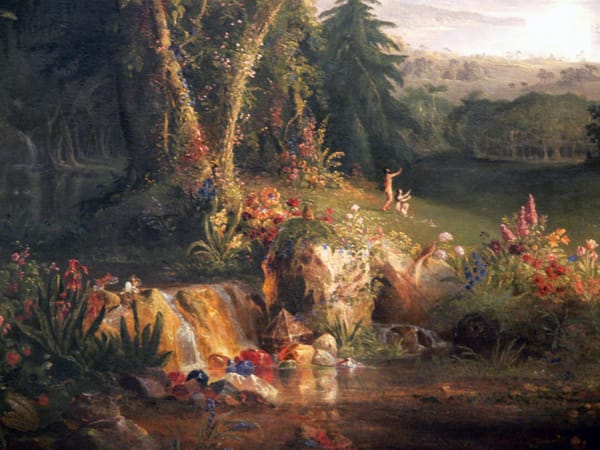Illusions & Delusions - Part 2
From dark delights to flights of fancy, experience this incredible finale of a fugue month half-lived and less remembered.

I regrettably have not been as productive in the hobby this month as I might have envisaged: the mirage receded. Fortunately, the clarion of the February RPG Blog Carnival was heard far and wide, and several spectres rose from their slumber to answer the call with their own contributions on the theme of Illusions & Delusions, that I bring to you on this singular day more oft forgot:
Surrealism and the King In Yellow
Ighton over at the Serene Library kicked things off by finding Le Roi en Jaune (1984) at the back of a used bookshop, and discovering the impossible and personal horror that the included portrait for one of the lead performers from opening night bears an uncanny resemblance to themselves.
Illusions & the Gameplay Loop
Seed of Worlds' Xaosseed subsequently cognized the division of active versus passive, rather than internal versus external, illusions. I agree with their premise that the former framing is more practical: for is not a shared (external) hallucination just the firmament of our own waking surreality?
Mondenberg Notes: Shadow Magic
Empedocles the Wizard's Elemental Reductions refracts the umbra of arcana obscura through a twilit lens to reveal a phantasmagoria of shadowmancy spells, suitable for all gaming in the fantastical folk tradition that's been twice-bathed in moonlight.
In magic, Illusion is actually Enchantment
The titubating and titular vdonnutvalley casts charm person to make you perceive your interlocutor as a most pleasing individual, and challenges the orthodox Wizarding dogma of illusions & enchantments, and how never the twain should meet.
Actual Test: House of Illusions
Hitting two for two, Xaoseed followed up on Seed of Worlds with an after-action report on their players tearing down the fourth-dimensional house of Tarot cards of a scintillating solipsistic sophont.
Humble Offerings
For my own part, I bottled up but two errant beams of numina, which will once and future be medically proven to improve complexion if one proctally enemizes regularly:
Illusions & Delusions - Part 1
The post that started it all: a hack dictionary of psychosensuopathology for the jobbing make-believe make-believers, and battleground for the pedants and psychofants resident to Arkham.
I Want to Believe
Distilling the gentle art of persuasion into exchange, leverage, and consistency to provide a transparent framework for Masters and their Charges to adjudicate both mundane and mystical petitions.
Disbelieve: Slush Pile
I have much more to say on these topics, as teased in my Part 1 post, but for want of due time and care, shall resign myself to merely prismatic spray these discordant thoughts from my mental blunderingbuss:
Mechanising & Portraying Mental Health
Sanity mechanics in games can be problematic, and can promote harmful play at the table. It is kinder to aim for inclusivity by focussing play on shared experiences: how we all at times feel stressed, anxious, depressed, over-elated, and even a bit paranoid or mistaken. We can each explore the ideas of illusions, hallucinations, and delusions in our make-believe play without recourse to harmful labels or depictions. We don't need to other people by labelling a fictional character with a clinical diagnosis: medical terminology is a necessary tool of healthcare, but does not adequately define people or their lived experiences. The map is not the territory.
Surreality & Dreamscapes
Imagination gaming provides an unparalleled medium for exploring surrealism through oneiric landscapes: no other medium permits such fuzzy, associative logic. In point of order, all gaming leverages these tools to some degree: through our shared perspectives and conversations we weave a narrative and otherworld through play that simultaneously feels real and unreal, tangible and intangible. There exists unexamined space-time between each scene of play: buying supplies in town, walking across meadows, trespassing past the threshold into the canonical dungeon. What happened between those moments? Is it necessary or even desirable for a purely imagined space to be Euclidean? We are each invested with such a giddying capacity for conscious plasticity and apophenia - let us walk together past undreamt horizons.
Lines of narrative authority and (un)reliable narrators
Much has and will be said of who gets to say what and when in gaming: this has been termed narrative authority or control, or "the line." In traditional play cultures, each player has narrative authority over one character and their thoughts and feelings and actions, while the GM has authority over everything else in the imagined world. The game (both as written and played, and fortified by a bevy of unwritten social contracts) holds governance over the messy no-man's land in-between: for little meaningful play can occur beyond that space where a character interacts with the world.
Illusions, enchantments, and surreality all tamper with this substrate because they operate from within this boundary between a player character's internal personhood and agency, and the external wider fictional world. They twist the narrator, the person presently holding narrative authority, into an unreliable witness of events and reality. High-trust play is a necessary but not sufficient precondition; we need to ride the tension-wave between playing generously but misleadingly. Like engaging with stage magic and mentalism, you as a player need to hold a suspension of disbelief: you need to want to believe.
Latecomers & Hitting The Road
If any of this has stirred in you a sudden dark urge to take to the pen and channel your own missive from beyond the veil, please just comment with a link to your manuscript below, and I'll make sure to share it with the entities that sail the astral plane behind the lake's mirrored surface, the readership.
Next month, the carnival will peg its tent at Vdonnut Valley, with the theme: Feasts, Foods and Fancy Drinks, oh my!




